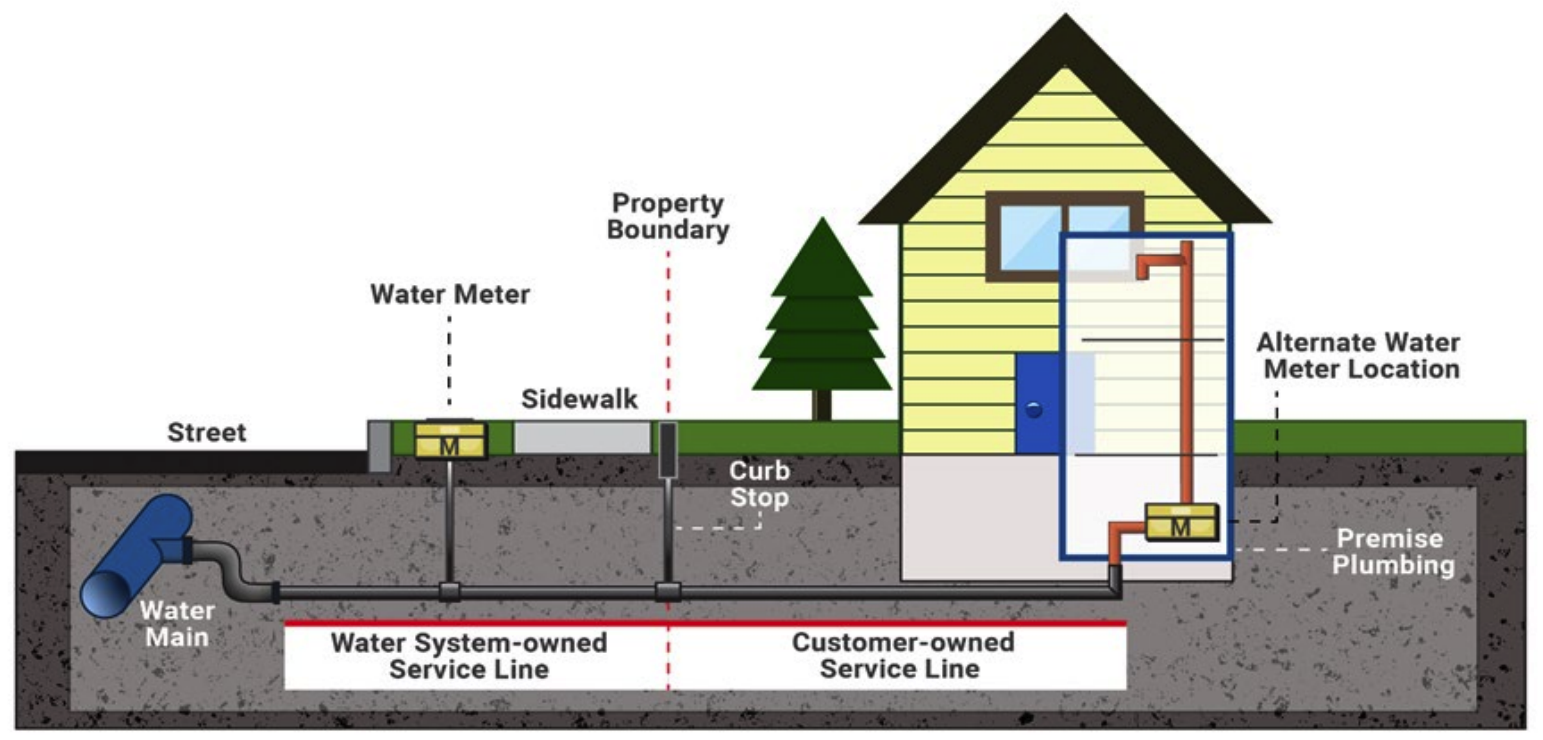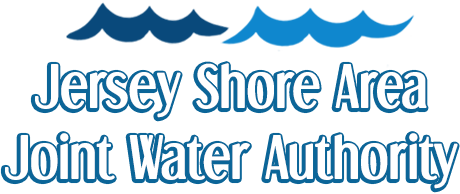1. What are the potential issues with lead or galvanized steel service lines?
There is no safe level of lead exposure. If present, elevated levels of lead can cause serious health problems, especially for pregnant women and young children. Lead contamination of drinking water is often the result of corrosion, the dissolving or wearing away of metal caused by a chemical reaction between water and plumbing materials, in the plumbing or water service lines belonging to water customers. Galvanized iron or steel pipes that were or are downstream of lead materials are also a concern, as they may also contain lead that can corrode or leach lead into drinking water. Galvanized iron or steel pipes that were or are downstream of lead materials (or downstream of a water service line whose material is unknown) are referred to as “galvanized requiring replacement,” as they should also be replaced to protect public health.
The Jersey Shore Area Joint Water Authority is responsible for providing high quality drinking water but cannot control the variety of materials used in customer plumbing components. The Authority conducts routine testing to ensure that our drinking water meets all state and federal water quality requirements. The Authority also treats water to prevent corrosion and leaching of lead into the water supply. Lead is not detected in the Authority’s drinking water when it leaves the treatment plant, and there is no current concern about lead at large in our water system. The Authority has rarely encountered lead materials within its distribution system, and it is the Authority’s practice to remove any lead materials discovered during routine work. To comply with federal and state regulations and identify any remaining potential sources of lead, the Authority is conducting a thorough inventory to document the material of all water service lines in its service area.
2. What is the Authority doing now?
In 2022, the U.S. Environmental Protection Agency (EPA) released the Lead and Copper Rule Revisions (LCRR) (which amended the 1991 Lead and Copper Rule), establishing new requirements for protecting people from lead in drinking water. Under the LCRR, water systems must provide an inventory of their water service lines by October 16, 2024. The Authority has some records of service line material (mostly related to the Authority-owned portion of the service line) and continues to collect information during routine work.
Authority staff are also collecting information on the customer-side portion of the service line as part of the water meter replacement program, which began in April 2023. The water meter replacement program is not complete, and some property owners have not yet scheduled meter changeout appointments. The Authority continues to request all property owners cooperate with the water meter changeout program. Please call (570) 398-1443 to schedule an appointment to have your meter changed. Authority staff will also collect lead service line inventory information while we change your water meter.
3. How do I know if I have a lead or galvanized service line that is requiring replacement?
Federal requirements for public water systems to use “lead-free materials” first became effective in Pennsylvania on January 6, 1991. If you live in a home built after January 6, 1991, it is unlikely that you have lead materials in your service line or home plumbing. It is still important that the Authority document the material of all service lines to comply with all federal and state requirements regardless of when your home was built.
Directions for how to identify your service line material and submit this information are located on our website by clicking here. If your water meter was replaced within the last two years, it is likely that the Authority already collected information on your service line material while completing the meter changeout.
- Not sure when your water meter was replaced? Please call our office at (570) 398-1443 to confirm.
- Still need to have your water meter replaced? Call us to schedule an appointment, and we can verify the material of your service line at the same time!
4. What if I am unable to identify my service line material?
Please email gettheleadout@jerseyshorewater.com or call the office at (570) 398-1443 for assistance if you are unable to identify your service line material or would like to schedule an in-home appointment to have Authority staff help verify the material.
5. What if I don’t have access to a smartphone or the internet to submit a verification online?
Please call the office at (570) 398-1443 for assistance.
6. What will the Authority’s follow-up be if I report that I have a lead or galvanized service line that is requiring replacement?
Authority staff will review the information submitted to confirm that the service line is in fact a lead or galvanized service line that is requiring replacement. Once confirmed by Authority staff, the customer will receive follow-up instructions, including information on how to obtain a water filter, options for testing their water for lead, and options for replacement. Customers should be sure to include their contact information when filling out the Water Service Line – Customer Survey here.
7. What is the timeframe for replacement if I report that I have a lead or galvanized service line that is requiring replacement?
The Authority has rarely encountered lead materials within its distribution system, and it is the Authority’s practice to remove any lead materials discovered during routine work on the Authority-side of the service line Property owners can help confirm the material of their portion of service line by submitting the Water Service Line – Customer Survey or scheduling an appointment with Authority staff. To comply with federal and state regulations, the Authority may need to also conduct field investigations (e.g., limited excavations) to confirm the service line material in some circumstances.
If you have a lead or galvanized service line that is requiring replacement, the Authority will provide information on how to mitigate your exposure to lead and options to replace the service line. The Authority is responsible for replacing any lead materials for the portion of the service line that it owns (the Authority-side), and the property owner is responsible for the portion of the service line they own (the customer-side).
A new federal rule for lead service line replacement is currently proposed. As written, the rule would require lead service line replacement within 10 years, but the Authority is continuing to proactively identify and replace all lead materials found on its side of the service line. The Authority encourages customers to participate in the service line inventory and will help provide information on options to replace any customer-owned lead service lines.
8. Who owns the service line?
Water service lines are separated into two separately owned sections. The Authority-side of the water service line from the water main to the curb stop (often located at the property boundary) is owned by the Authority. The customer-side from the curb stop to the house is owned by the customer/homeowner. The homeowner is responsible for maintaining the customer-side of the water service line.

9. Who is paying for the replacement?
The property owner is responsible for maintaining the customer-side of the water service lines, including replacing lead or galvanized service lines that are requiring replacement. The Authority can help provide information on options for service line replacement to property owners.
10. I have a lead or galvanized service line that is requiring replacement. How do I minimize the potential for lead exposure through drinking water?
If your service line is determined to be a lead or galvanized service line that is requiring replacement, the Authority will provide information on how to mitigate your exposure to lead and options to replace the service line.
If your water has been sitting for several hours, you can minimize the potential for lead exposure from lead-based plumbing components by flushing your tap for 2 to 5 minutes before using water for drinking or cooking. If you are concerned about lead in your water, you may choose to have your water tested. Information on lead in drinking water, testing methods, and steps you can take to minimize exposure is available from the U.S. EPA’s Safe Drinking Water Hotline or at https://www.epa.gov/ground-water-and-drinking-water/basic-information-about-lead-drinking-water.
11. What happens if I don’t submit my information?
The Authority is required by the EPA and PA DEP to provide an initial inventory of its lead service lines by October 16, 2024. Outreach to property owners that have not responded will add additional costs to the project and may increase the possibility that the Authority must conduct limited excavations along the service line to identify the material. Any remaining unidentified lines after October 16, 2024 will be considered “unknown,” which would result in additional reporting and administrative burdens for the Authority.
To increase efficiency, the Authority collects service line information when changing your water meter. If your water meter has been replaced in the last two years, it is likely that the Authority already collected information on your service line material when completing the meter changeout. The Authority continues to request that all property owners cooperate with the water meter changeout program. If you have not had your water meter replaced (or if you would like to confirm when your meter was replaced), please call our office at (570) 398-1443. If a new water meter is required, Authority staff will also verify the material of your service line while replacing your water meter. Property owners that do not cooperate with the water meter changeout program may be in jeopardy of having water services discontinued until a water meter appointment is scheduled and completed.
